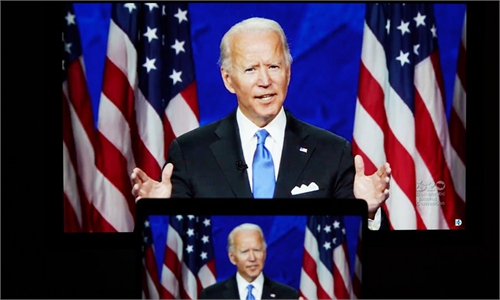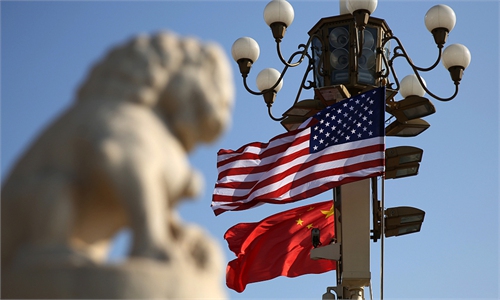Biden can't save US from darkest period of epidemic
Policies unable to solve systemic problems leading to failure to contain virus

People do shopping at a winter fair in New York, the United States, Nov. 9, 2020. (Xinhua/Wang Ying)
"I know that we can and will beat this virus," US President-elect Joe Biden said in a Thanksgiving speech on Wednesday.
However, experts warn that, despite his determination, it is possible that Biden can only watch the US slide into the abyss of infections but can do nothing as he will not take office until January 20, which means he will miss three important chances - the presidential election, Thanksgiving and Christmas - to take effective measures to prevent cluster infections.
The COVID-19 epidemic proves that US' system is not able to handle such a great public health crisis, against which Biden is actually helpless, even if he can improve anti-epidemic measures, experts said.
According to media reports, daily new infections in the US exceeded 100,000 for four consecutive days after the presidential election on November 3, as US authorities allowed Americans to go to the polling stations to vote even if they tested positive for COVID-19.
As of November 6, 41 states in the US had reported an increase in weekly new infections. US media said that the US would potentially enter "the darkest and potentially deadliest period of the coronavirus pandemic" during the election.
Biden's team has released a detailed plan to combat the epidemic. He had also vowed to push for more Americans to wear masks to curb the virus' transmission.
However, Chinese analysts noted that Biden would not take office until January 20, so his measures don't offer immediate help. Not to mention that he probably would not even be able to persuade many Americans to wear masks, as many people have been brainwashed by President Donald Trump, who claimed that getting COVID-19 was just like getting a cold and wearing masks was only political correctness.
A more fundamental problem leading to US' failure to combat the epidemic lies in its system, rather than the measures, Ye Hailin, a deputy director-general at the National Institute of International Strategy of the Chinese Academy of Social Sciences, told media.
Even if Biden improves the nation's policies after taking office, he would not be able to change the problems in the US system, like the separation of powers between the federal government and the states, the autonomy of medical institutes, excessive capital intervention in the medical industry, or even the degree of cooperation by the public, which is affected by the system, Ye said.
Epidemiologists predict the epidemic in the US is likely to worsen considering the Thanksgiving and the upcoming Christmas holidays, when Americans usually gather to celebrate or hold reunions with their families.
"Thanksgiving is like China's Mid-Autumn day. American families usually meet on this day, so virus generation-skipping transmission is unavoidable," warned Chen Xi, an assistant professor of public health at Yale University.
According to Chen, US schools prepared for potential outbreaks during the holidays. For example, Yale University has told its students not to come back after Thanksgiving to prevent cluster infections.
But there are too many daily new cases, and every day sees a new record, Chen noted.
According to data from the John Hopkins University, the US had reported 12,780,047 cases as of 9:30 pm (Beijing time) Thursday.
Wednesday was the 33rd consecutive day that the US set a new record in its seven-day average of reported cases at 175,540, the Washington Post reported.
Chen estimated that average daily deaths in the US would be about 2,500 in January. The situation would not change unless a massive vaccination effort is conducted.
US vaccine producers Pfizer and Moderna released interim data from clinical trials on their COVID-19 vaccine candidates earlier this month. Both companies have said that they planned to apply for urgent use authorization from the US Food and Drug Administration in the following weeks.



